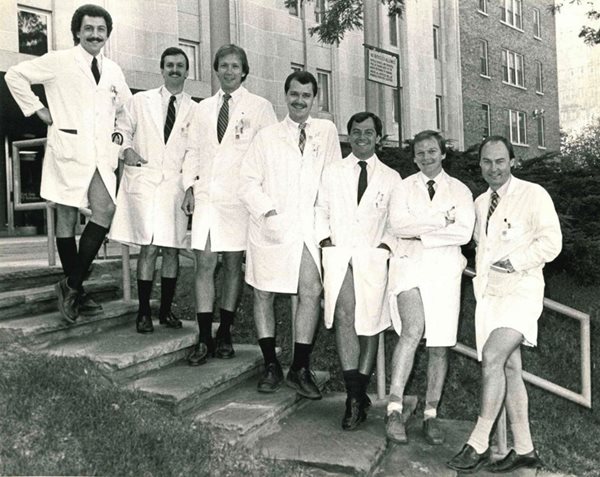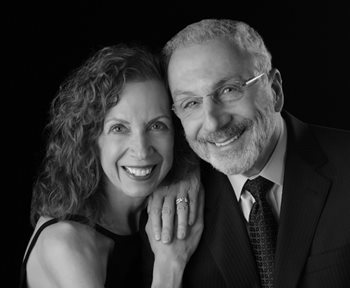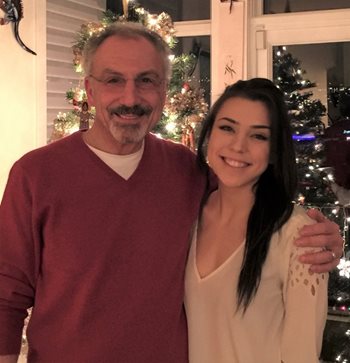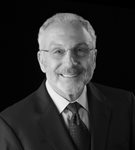Vincent S. Mosca, MD
Dr. Vincent S. Mosca was born in Brooklyn, NY. His father was 2 years old in 1911 when his family immigrated from Sicily through Ellis Island, settling in Brooklyn. The family was very poor, and Dr. Mosca’s father was forced to drop out of school after completing 8th grade to find work to help support the family. In the late 1920s, he became a police officer at a time when the educational requirements were much less stringent than they are today. When Dr. Mosca was 4 years old, his father moved the family to New Hyde Park on Long Island to give them better opportunities for education and safety while he continued to work as a policeman in Brooklyn. Police salaries were low, and he worked 1-2 additional jobs to make ends meet. Despite minimal education, Dr. Mosca’s father was extremely talented in using his mind and hands to perform plumbing, electrical, furnace, car, and all other repairs. But his passion was woodworking, leading him to remodel the entire house and creating much of the furniture in it. Dr. Mosca reflects that his time spent helping his dad on weekends was great training for a career in orthopaedics! Dr. Mosca’s mother and family immigrated from another city in Sicily not long before she was born. They also settled in Brooklyn and were very poor. Her father died in the early months of her freshman year in high school, and she left school to work to help support her family. Dr. Mosca credits his parents for their tremendous encouragement and emotional support despite limited, but adequate, resources. His older sister became a central office administrator for a public school district. His younger sister is a registered nurse.
In addition to his sports team participation in school, he played the lead trumpet from 4th through 12th grade and trumpet and guitar in a private 5-piece jazz/rock band in middle and high school. He was also a lifeguard and surfer. After high school, Dr. Mosca enrolled at the University of Rochester, majoring in biology. He was active in his fraternity and competed on the Track and Swim teams. After graduating Magna Cum Laude and Phi Beta Kappa, he began his medical school education at the University of Rochester. As fate would have it, his assigned faculty advisor was Dr. C. McCollister Evarts, renowned arthroplasty surgeon, Chairman of Orthopedics at the University of Rochester, and past President of the AOA. Dr. Mosca always knew he wanted to become a surgeon, but his early contact with Dr. Evarts convinced him that orthopaedics matched his personality and interests.
Duke University was Dr. Mosca’s first choice for residency, despite it being the last of the 6-year orthopaedic programs. During the first two rigorous years in the General Surgery Department, he had several rotations in plastic surgery during which he learned meticulous soft tissue handling techniques. These skills turned out to be important for his career in pediatric foot reconstruction surgery.
Dr. Mosca was strongly influenced by Dr. J. Leonard Goldner, Chairman of Orthopedics at Duke. Dr. Goldner had a very general orthopaedic practice but was passionate about clubfeet, believing that all clubfeet needed extensive surgery. Dr. Mosca admired Dr. Goldner’s ability to assess pediatric foot deformities and clubfoot in particular. Interestingly, he says that the primary reason he chose a career in pediatric orthopaedics was because he loved operating on clubfeet.
 Photo (left) – 1984-85 Pediatric Orthopedic Fellowship class at Sick Kids, Toronto. We were told to wear shirts, ties, and white coats, but they did not specify pants… L-R: Vince Mosca, Jack Heydemann, Jeff Akeson, Mark Cristofersen, Charlie d’Amato, Raymond Briggs, Stellan Ungerholm.
Photo (left) – 1984-85 Pediatric Orthopedic Fellowship class at Sick Kids, Toronto. We were told to wear shirts, ties, and white coats, but they did not specify pants… L-R: Vince Mosca, Jack Heydemann, Jeff Akeson, Mark Cristofersen, Charlie d’Amato, Raymond Briggs, Stellan Ungerholm.
Dr. Mosca did his pediatric orthopaedic fellowship at The Hospital for Sick Children, where he was assigned to work with Dr. Colin Moseley. Known as a great educator, Dr. Moseley would always ask questions that, even when answered correctly, would invoke a provocative follow-up question: “True, but do you think that will be the right answer in a few years?” This approach to knowledge strongly influenced Dr. Mosca’s professional inquisitiveness and creativity throughout his career. In addition to his primary assignment with Dr. Moseley, Dr. Mosca had the opportunity to work with Dr. Norris Carroll, a great thinker, clinician, and technical surgeon. Dr. Mosca learned Norris’ eponymous clubfoot operation that was quite different from Goldner’s. Finally, Dr. Mosca performed the McKay clubfoot procedure on several occasions with Dr. Peter Armstrong, who had just joined the faculty. This 3rd technique, completely different from the Goldner and Carrol approaches, had the same reported 85% good to excellent results at 2-year follow-up. Dr. Mosca determined that he would “never write a paper on the ‘Mosca’ clubfoot operation.”
It remains a paradox that as one of the world’s most highly trained clubfoot surgeons, Dr. Mosca would one day lead the charge to abandon these operations in favor of the Ponseti method. Despite his mastery of the disparate surgical approaches to clubfoot, long-term follow-up studies of operatively treated clubfeet convinced him to be one of the first pediatric orthopaedic surgeons to fully embrace and adopt the Ponseti method when it “came out of the closet” in 1995. In reality, the worldwide adoption of the Ponseti method needed Vince Mosca almost as much as it needed Dr. Ponseti. If one of the most skilled clubfoot clinicians abandoned surgery, the rest of us should probably consider following suit.
Dr. Mosca is arguably the world’s expert in managing pediatric and adolescent foot deformities. His interpretation and development of a technique for flatfoot reconstruction surgery, based on Mr. Dillwin Evans’ concept, has become the standard that is now used around the world. His book, Principles and Management of Pediatric Foot and Ankle Deformities and Malformations, is the culmination of a career dedicated to understanding, developing, simplifying, and teaching the biomechanics and principles of assessment and management of pediatric foot deformities. As he often says of its unique format, his book is his brain on paper. Not every foot deformity requires surgery. Non-surgical treatment is often best. The questions “when” and “why” must be answered before performing surgery. His book also presents dozens of his detailed, tested, and well-illustrated surgical techniques.
During his career, spent entirely in Seattle, he has educated ~400 orthopaedic residents and pediatric orthopaedic fellows while leading the Department of Orthopedics at Seattle Children’s Hospital as Director and Chief for 13 years. He has provided over 4,000 free-of-charge email patient consultations to approximately 500 U.S. and international orthopaedic surgeons and provided clinical observerships for 46 international pediatric orthopaedic surgeons. Dr. Mosca recognizes that his mentor and partner, Dr. Lynn Staheli (founding member of POSNA and co-founding editor of JPO), taught him much about being a professional and a human being and about the importance of teaching internationally.
Dr. Mosca’s service to POSNA includes serving as Specialty Day/One Day Course Chair, Chair of the Membership Committee, Orthopedic Knowledge On-Line Committee, Board of Directors, Chair of Education Council, and faculty at IPOS® for the last 24 years. Dr. Mosca reflects that while he loves POSNA and recognizes that he could have taken greater leadership roles, he felt uniquely qualified to educate pediatric orthopaedic surgeons around the world regarding pediatric foot deformities and knew that others could/would lead in POSNA. Over the last 37 years, he has served as an invited guest speaker/visiting professor in 34 countries 79 times, and over 100 times in the U.S. Despite retiring from clinical activities last year, he is still active in research, teaching, and writing, including writing the second edition of his book.

Dr. Mosca is married to Shirley Mosca (
pictured left), who is a charming and engaging life partner and who, with her husband, recently hosted the 2022 IPOTT Meeting in Seattle. Shirley is an independent insurance broker for Medicare Advantage and Supplement Plans and on occasion, provides professional guidance to POSNA members on retirement planning for healthcare services. Dr. Mosca’s daughter Arianna Mosca (
pictured below) has an MBA and is a digital engagement manager in marketing for Fidelity International based in Frankfurt, Germany.
Dr. Mosca is an exercise fanatic, working out 5-7 days per week regardless of the weather or the country or state he is in. He fondly remembers cycling in the French Alps during the 2005 Tour de France with a group of 17 other cyclists—1.5 miles of elevation and 75-80 miles of distance over 3-5 mountains per day for 6 straight days.

Dr. Mosca’s “lessons learned” during his career:
Master your knowledge and skills as fast as possible. You’ll continue to learn and improve for your entire career, but the gains will plateau long before you retire.
Mentor the next generation. If what we do was easy, anyone would do it—but it isn’t easy. We need to help the next generation acquire the almost exponential increase in knowledge and skills that, frankly, we didn’t need to acquire at the start of our careers. Early in your career, find mentors and meet with them regularly. Then become a mentor to others in pediatric orthopaedics, life balance, and the pursuit of happiness.
Move Over and let your mentees take over when it is no longer as much fun as it used to be at the top of the plateau. But you must prepare for it. Nurture hobbies. Make 5- and 10-year plans, especially towards the end of your career. And note that the fulfillment and gratification of mentoring doesn’t have to end at retirement.
Biography written by Dr. Ken Noonan, on behalf of the Hall of Fame Committee. 2023.


 Photo (left) – 1984-85 Pediatric Orthopedic Fellowship class at Sick Kids, Toronto. We were told to wear shirts, ties, and white coats, but they did not specify pants… L-R: Vince Mosca, Jack Heydemann, Jeff Akeson, Mark Cristofersen, Charlie d’Amato, Raymond Briggs, Stellan Ungerholm.
Photo (left) – 1984-85 Pediatric Orthopedic Fellowship class at Sick Kids, Toronto. We were told to wear shirts, ties, and white coats, but they did not specify pants… L-R: Vince Mosca, Jack Heydemann, Jeff Akeson, Mark Cristofersen, Charlie d’Amato, Raymond Briggs, Stellan Ungerholm.  Dr. Mosca is married to Shirley Mosca (pictured left), who is a charming and engaging life partner and who, with her husband, recently hosted the 2022 IPOTT Meeting in Seattle. Shirley is an independent insurance broker for Medicare Advantage and Supplement Plans and on occasion, provides professional guidance to POSNA members on retirement planning for healthcare services. Dr. Mosca’s daughter Arianna Mosca (pictured below) has an MBA and is a digital engagement manager in marketing for Fidelity International based in Frankfurt, Germany.
Dr. Mosca is married to Shirley Mosca (pictured left), who is a charming and engaging life partner and who, with her husband, recently hosted the 2022 IPOTT Meeting in Seattle. Shirley is an independent insurance broker for Medicare Advantage and Supplement Plans and on occasion, provides professional guidance to POSNA members on retirement planning for healthcare services. Dr. Mosca’s daughter Arianna Mosca (pictured below) has an MBA and is a digital engagement manager in marketing for Fidelity International based in Frankfurt, Germany. 